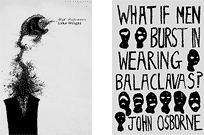
New Books from Nasty Little Press
High Performance
Luke Wright
Nasty Little Press, 2009
What If Men Burst In Wearing Balaclavas?
John Osborne
Nasty Little Press, 2010
Though Luke Wright and John Osborne are still two young turks in the often late-blooming poetry world, in these pithy and often delightful collections we find them flirting with adulthood. Sometimes they accept it, with all its disappointments, fears and subtle joys, and sometimes they please themselves and their audience by embracing pop culture and playground invective: Wright is clearly fond of talking about things that smell of wee; and Osborne seems possessed by a pathological hatred of Neil Morrissey – it all adds a bit of colour.
Despite both poets creating worlds full of humour and irony, they are also unafraid of facing the big concepts – ‘Death, God and the Universe’ is the title of one of Osborne’s poems. This preoccupation with mortality, quiet celebrations of the commonplace, hymns to suburbia, and occasional snarls of rage and sorrow, give a strong flavour of Larkin.
This is particularly the case for Luke Wright, whose collection features ‘high windows’, a very restrained British funeral, and even a whole poem devoted to the über-anthologised lodger Mr Bleaney, though in Wright’s world he is secretly a jumpsuit-clad swinger who couldn’t give a toss what some bespectacled loser might make of him, spending his secret weekends, ‘up till dawn/ On Friday snorting coke off an arse cheek/ With three of Duran Duran’.
By the time I’d finished the first page of High Performace I’d already laughed out loud twice, but as befits such humour there are moments of pathos too and plenty of self-disgust. The manic comic’s post-show shame creeps in as the poet remembers himself ‘crying and wanking on fringe theatre stages,’ or spewing gags to his tired but tolerant friends, who sometimes wish ‘someone had breastfed Luke as a child.’
While trying to play down his considerable triumphs, occasionally he comes close to what he accuses another character of doing – ‘having his cake then satirising it’– but I wouldn’t lose his hilarious howl of self-loathing, ‘Luke’s Got A Joke.’ When it comes to anticipating his detractors, Charlie Brooker with a hangover would be hard-pushed to out-bile him:
No Luke, don’t stop Luke, we’re keen to hear more
it’s better when you say ‘Don’t mention the war!’
Forget that night out at the Comedy Store
We’d rather hear Luke do some Blackadder 4.
The poet’s struggles – with fame, ambition, himself – come to a poisonous head in ‘Mr Blank’, a poem about a crooked talent scout who offers to make him famous. Their shallow relationship is shot through with mutual self-loathing, ‘a platonic love so vacuous/it made Des’ree look like René Descartes.’ Still, his compassion for ‘Mr Blank’ lifts the poem far above a simple slagging-off, shining the same merciless light on Wright’s longings and delusions. It’s a bold move, and one that pays off.
While both books have references to festivals, the Fringe, and drinking champagne from crystal flutes, or even, in one poem of Osborne’s, pint glasses, the boys both engage with a more settled-down life in which listening to Stuart Maconie isn’t necessarily a crime.
The title poem of Osborne’s pamphlet has the protagonist fearfully imagining men in balaclavas bursting through the ‘patio doors’ into a scene of domestic bliss, setting the tone for a collection in which life is often pleasant, potentially frightening and sometimes magical. In one poem, he imagines leading a deer through the turnstile at Ealing Broadway; in another, he hacks into his company’s intranet and posts Simon Armitage poems. In reality, he frets about money, death and relationships, drinks Southern Comfort and listens to the Super Furry Animals.
What If Men Burst In Wearing Balaclavas? covers similar thematic terrain to Wright’s book, but the tone is very different. While there are fewer barnstorming performance pieces and heart-on-sleeve bits of seriousness, Osborne’s poems are funny, quietly self-assured and often more than a little sad. His gentler approach allows the reader to identify with his bemused characters, who bumble along bouncing cheques ‘like a ping-pong ball/falling from a pocket/at a funeral’, failing to fix washing machines and fantasising about a local girl who drives a Toyota Yaris, their stomachs full of butterfly wings:
I want to tell her about the butterflies
But when I try and talk to her
It’s like we’re playing hide and seek
I have got my eyes closed
And I’m counting to one hundred.
Throughout this moving, resonant collection, Osborne’s speakers console themselves by insisting that heartbreaking things can’t happen because ‘it’s Glastonbury in June’ or ‘only two weeks until we go to New York’. To quote one of his titles, ‘We’re All Going to Die’ – but yes, there will still be Glastonbury, and fajitas, The Mighty Boosh, and Hancock’s Half Hour. There’s still honey for tea, or to quote one of my favourite lines from Osborne’s title poem, ‘a case of red wine to get through/and a massive Toblerone’.


